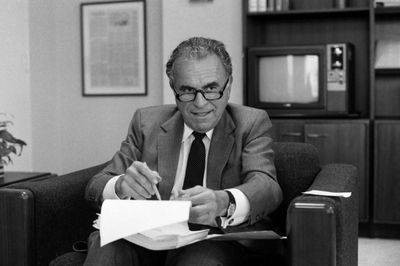Charles Z. Wick, shaped the USIA

Charles Z. Wick, the long-serving director of the U.S. Information Agency who raised the agency’s profile, doubled its budget and extended its ability to reach foreign audiences through new technology such as satellite television, died of natural causes last Sunday at his Los Angeles home. He was 90.
Wick, a close friend and adviser of President Reagan and his appointee, was the USIA’s longest-serving director, filling the post from 1981 to 1989. A venture capitalist, real-estate investor and former movie producer, he brought Hollywood-style pizazz to an agency that had long been treated as a government backwater and made it a prominent part of Reagan’s Cold War apparatus.
Among his successes was WorldNet, a satellite TV network that let the Reagan administration broadcast to other countries American viewpoints on sensitive international events, such as the Soviet crackdown in Poland against the Solidarity trade union movement in 1981.
He launched Radio Marti, a radio network that sent daily broadcasts to Cuba in 1983. He also developed programs that brought U.S. news and features to Europeans in two-hour broadcasts five days a week.
“Charlie Wick was magnificent in letting the world know about Ronald Reagan’s America,” former Secretary of State George P. Shultz said in a statement Tuesday.
Wick also weathered numerous controversies, most notably the disclosure that he secretly taped phone calls to his office from government officials, celebrities and friends. After initially denying that he surreptitiously recorded conversations, Wick acknowledged the taping and apologized for it as “insensitive and dumb.”
Robert Berning, wine buyer
Robert Berning, who as the principal wine buyer for Trader Joe’s beginning in the 1970s helped introduce consumers to bargain-priced wines from around the globe, has died. He was 73.
Berning died of bone cancer July 19 at his home in Fallbrook, Calif., said his daughter, Christina Coulourides.
Berning was an experienced grocer in 1965 when he was hired as a store manager for Pronto Markets, a chain of convenience stores in the Los Angeles area that began being transformed into the specialty grocery store chain Trader Joe’s in 1967.
“After we converted Pronto Market into Trader Joe’s, wine merchandising became paramount, and so about 1970 we brought Bob into the office as wine buyer because he had expressed a great interest in the subject,” Joe Coulombe, founder and former owner of Trader Joe’s, told the Los Angeles Times on Monday.
Coulombe said 1970 marked the beginning of Trader’s Joe’s “aggressive wine merchandising” – offering wines at “lower prices than had been common in the trade.”
“Basically,” he said, “this state had fair trade on alcoholic beverages, so it was against the law to break price on Gallo or any other branded wine, and under Bob’s leadership, we learned to get around fair trade.”
As head wine buyer, Berning built Trader Joe’s private label wine program, in which various wines from around the world were sold under Trader Joe’s own labels for which it could set lower prices.
Coulombe said Berning “innovated not just the buying of the wines, but the logistics: our ability to distribute the wines to our stores because conventional wholesalers were not going to do that for us.”
Trader Joe’s, he said, was “one of the reasons that wine took off” in popularity.
Johnny Griffin, ‘Little Giant’ of sax
Johnny Griffin, the tenor saxophonist known as the “Little Giant,” whose big, rich sound and lightning speed made for a distinct musical signature during an era when bebop was king, has died. He was 80.
Griffin died Friday at his home in France, his agent, Helene Manfredi, told Bloomberg News. The cause was not reported.
Although he was often called the “world’s fastest saxophonist,” Griffin – who jammed with greats including Thelonious Monk, John Coltrane and Art Blakey – did not see speed as the key element of his playing.
“Everybody called me a racehorse, but feeling good is my thing,” Griffin said in a 1995 Los Angeles Times article. “Art Blakey used to say to me, ‘You fire that (saxophone) like it’s a machine gun.’ I’d say, ‘Yeah, man, but those are pellets of love.’ ”
Griffin is credited with helping to spark renewed interest in bebop in the 1970s, with performances at the Montreux Jazz Festival in 1975, in Tokyo in 1976 and throughout the U.S. in the latter part of the decade.
Griffin had an explanation for the speed that defined his style.
“I got so excited when I played and I still do,” he once said. “I want to eat up the music like a child eating candy.”